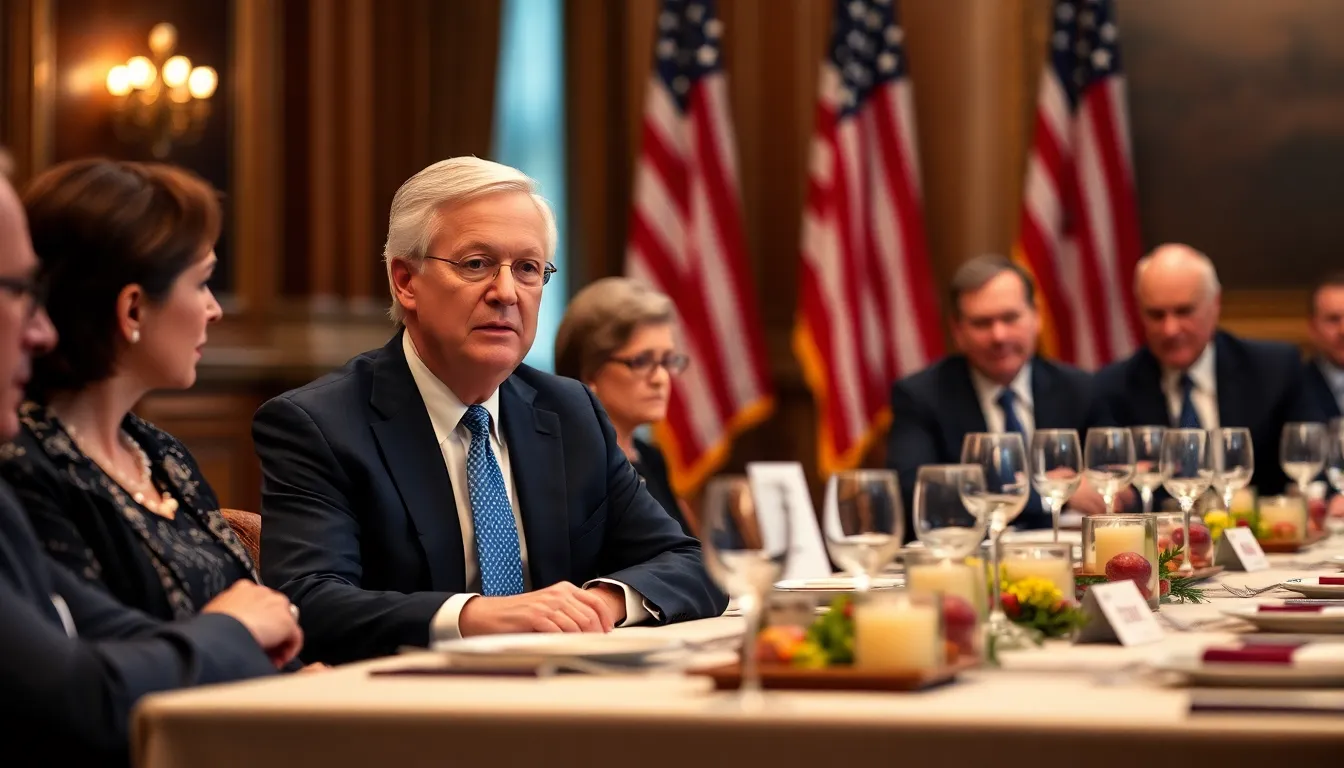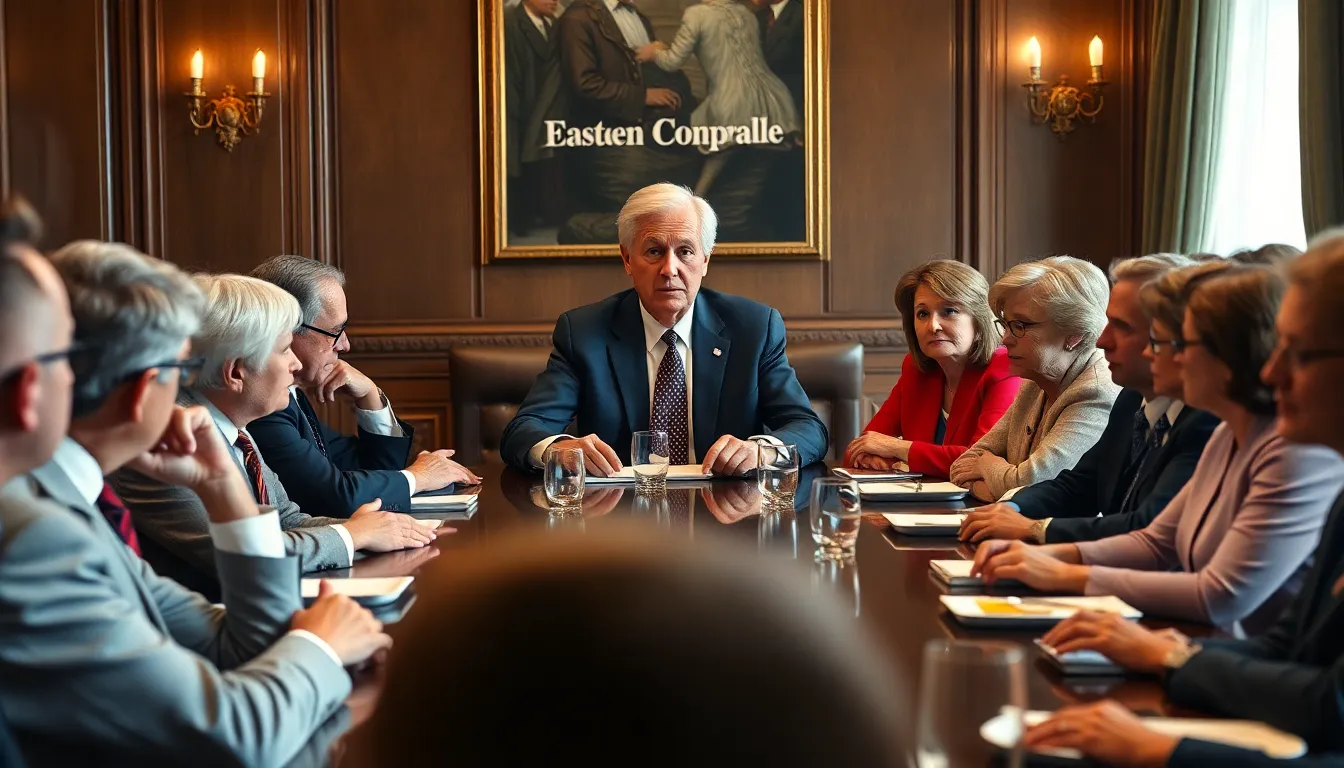Table of Contents
ToggleAs the crisp autumn air settles in, the Senate Republican lunch takes center stage, drawing attention to the party’s dynamics and leadership. Mitch McConnell, the long-standing Senate Minority Leader, finds himself navigating a complex political landscape, balancing party unity with differing viewpoints among his colleagues.
This gathering isn’t just about sharing a meal; it’s a strategic opportunity for McConnell to rally support and address pressing issues facing the Republican Party. With critical legislative battles on the horizon, the stakes are high, and every discussion matters. As the lunch unfolds, it reveals insights into the direction of the GOP and McConnell’s role in shaping its future.
Overview of Mitch McConnell’s Fall Senate Republican Lunch
Mitch McConnell’s Fall Senate Republican lunch functions as a crucial gathering for party leaders and members. It enables McConnell to strategize on legislative priorities. The lunch provides a platform for discussing key issues, fostering collaboration, and ensuring a unified stance among senators.
During these lunches, McConnell addresses critical topics affecting the Republican agenda, such as economic policies, healthcare reforms, and upcoming elections. He emphasizes unity among senators to strengthen their collective voice. McConnell’s leadership style encourages open dialogue while managing differing viewpoints among colleagues.
Key participants at the lunch typically include prominent Republican senators, committee chairs, and emerging leaders. Their presence enhances the conversation and facilitates informed decision-making. The dynamic within the room reflects the broader challenges faced by the party, such as navigating partisan divides and appealing to diverse voter bases.
Ultimately, these gatherings serve as a strategic tool for McConnell to align the Senate Republican caucus. Maintaining party cohesion amidst external pressures proves vital in pursuing legislative goals and addressing constituents’ needs.
Key Highlights from the Lunch


The Fall Senate Republican lunch serves as a crucial platform for significant announcements and notable attendees, reflecting key strategic discussions within the party.
Significant Announcements
Mitch McConnell used the lunch to unveil several important legislative priorities for the upcoming session. He emphasized efforts to advance economic policies aimed at boosting job growth and inflation control. Healthcare reforms, particularly those addressing prescription drug costs and insurance accessibility, emerged as additional focal points. McConnell also notified attendees about upcoming election strategies, including candidate support and fundraising initiatives, to strengthen the party’s position heading into election season.
Notable Attendees
Several prominent Republican senators attended the lunch, contributing to the discussions around legislative strategies. Key figures included Senate Majority Whip John Thune, Senate Republican Conference Chair Joni Ernst, and other influential committee chairs. Emerging leaders and representatives from various states participated, ensuring diverse perspectives within the party. Their presence highlighted a commitment to unity and collaboration as they prepare to tackle pressing issues ahead.
Reactions from Senate Republicans
Reactions from Senate Republicans surrounding the Fall Senate lunch reveal a mix of support and concern regarding McConnell’s leadership and policies discussed during the event.
Supportive Voices
Supportive voices within the Senate Republican caucus praised McConnell’s cohesive approach to unifying party members. Senators such as John Thune and Joni Ernst expressed confidence in McConnell’s ability to navigate upcoming legislative challenges. They lauded his focus on economic policies aimed at job growth and controlling inflation, emphasizing the importance of these priorities for constituents. Moreover, they supported McConnell’s calls for unity, viewing it as essential for electoral success in the upcoming elections. Freshman senators appreciated McConnell’s willingness to engage with newer members, fostering a sense of inclusivity and collaboration within the party.
Critiques and Concerns
Critiques emerged from various factions within the Senate Republican caucus, voicing concerns about McConnell’s handling of party dynamics. Some senators questioned whether his strategies adequately address the challenges posed by a divided electorate. Concerns also arose about the perceived lack of boldness in pursuing more comprehensive healthcare reforms, with certain members advocating for a stronger stance on prescription drug pricing. Additionally, a few senators expressed anxiety about the party’s overall direction, sensing a need for clearer messaging to resonate with constituents. These voices highlighted the ongoing tension within the caucus as members balance loyalty to leadership with individual viewpoints and aspirations.
Implications for Future Legislation
McConnell’s Fall Senate Republican lunch outlines several implications for upcoming legislative sessions. Each gathering facilitates critical discussions that shape the Republican Party’s legislative agenda. McConnell’s emphasis on unity underscores the necessity for a coherent stance on pivotal issues, enhancing the party’s ability to present a united front in negotiations.
Economic policies dominate the agenda, focusing on job creation and inflation control. These priorities reflect constituents’ concerns, signaling a proactive approach as McConnell aligns legislative strategies with voter interests. Addressing healthcare reforms remains equally crucial, particularly regarding prescription drug pricing and accessibility. McConnell’s commitment to these issues will likely guide discussions and legislative drafting in the coming months.
The presence of influential senators like Thune and Ernst during the lunch indicates the significance of collaborative leadership. Their support suggests a solidified strategy concerning candidate endorsements and fundraising efforts, crucial for maintaining Republican dominance in upcoming elections. This collaborative environment fosters a balance between leadership direction and members’ individual policy concerns, which is vital for achieving legislative goals.
Dissenting opinions within the caucus present challenges that may impact legislation. Some senators express skepticism regarding the adequacy of McConnell’s strategies in addressing diverse electorates. This tension may necessitate adjustments in party messaging and policy proposals to better resonate with constituents. McConnell’s ability to navigate these internal dynamics could define the legislative success of the Republican Party in future sessions.
Overall, the Fall Senate Republican lunch acts as a barometer for party cohesion and legislative priorities. The ongoing discussions underline the necessity for McConnell to adapt strategies while maintaining party unity, ultimately influencing the Republican Party’s effectiveness in addressing critical national issues.






